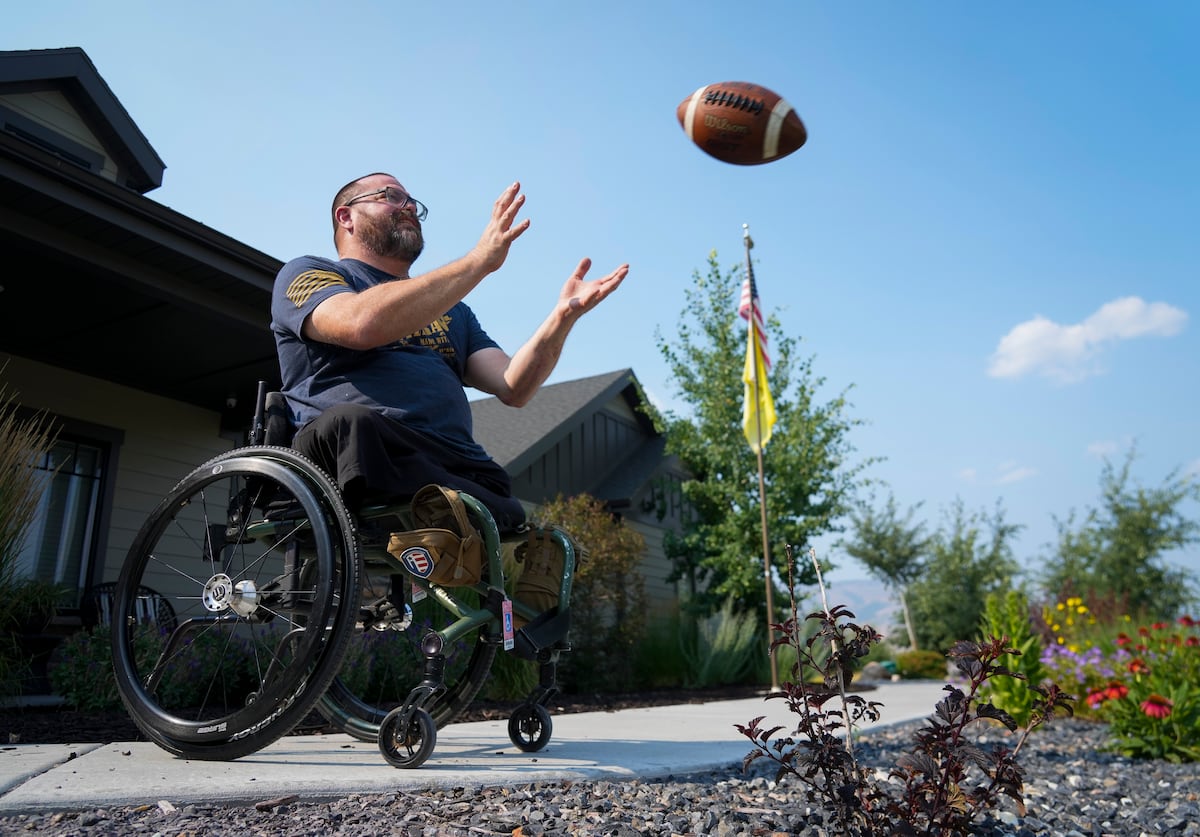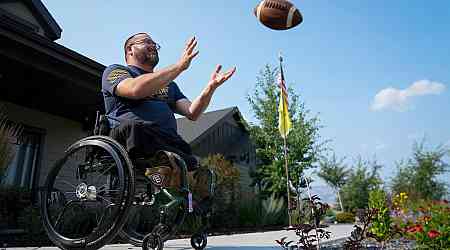Editor’s note • This article first appeared on The War Horse, an award-winning nonprofit news organization educating the public on military service. Subscribe to their newsletter.
Travis Vendela died three times in triage and medevac, by his own account, after the lead Humvee he was directing in Iraq in 2007 drove over an improvised explosive device and blew off both of his legs.
Scott Restivo lost his right leg to infection and sepsis in 2018 after surgery to address injuries he suffered at Fort Drum, New York, and aggravated in Iraq and Afghanistan.
Bone cancer claimed Army parachute rigger Matt Brown’s left leg after he served for years at Fort Liberty, North Carolina.
There’s no question about what the three Army veterans gave up for their country. Now, still active and in the prime of their 40s, they’re fighting to make sure the country doesn’t give up on them.
From Utah to Tennessee to North Carolina, they say they are all experiencing similar frustrations with the dense bureaucracy and gaps in care for prosthetics and accessibility equipment provided by the Department of Veterans Affairs.
Restivo has relied on duct tape and loaner legs since last year, awaiting repairs to a chip malfunction in his main prosthetic. Vendela bummed rides for months to the high school where he coaches football until a VA contractor finally installed the retrofits to help him drive his new truck. Brown was shocked when a vendor repossessed an ankle joint that improved his mobility because he said the VA hadn’t paid the bill.
All three say it’s maddening being forced to repeatedly prove why they need the parts and spare prosthetics to live with comfort and mobility.
“I’m not asking for a quarter-million-dollar payoff or something like that,” said Restivo, 47, who lives in Cedar Hill, Tennessee, north of Nashville. “I just want my life to be as functional as it can be.”
A billion dollar price tag
The concerns of amputee veterans and their advocates are now making their way to Capitol Hill, with site visits by the House Veterans Affairs Committee and letters from lawmakers signaling a growing acknowledgment of the program’s shortcomings.
It took VA more than a month to respond to The War Horse’s request for answers. The department twice rescheduled and then canceled an interview with VA’s top prosthetics officials, before ultimately providing 14 pages of responses on Friday to questions about its care for amputee veterans.
In some cases, officials pushed back on the veterans’ accounts of delays and mismanagement; in others, they acknowledged failings and said they’d do better.
“We recognize some veterans have faced delays in receiving their prosthetics, and we are actively addressing and resolving any delays in prosthetic services to ensure veterans receive the prompt care they need for their physical recovery and overall well-being,” Gary Kunich, a VA spokesman, said in the statement provided to The War Horse.
The number of veterans who lost a limb during the most recent wars is relatively small. A 2020 Government Accountability Office report put the number at just under 3,000 post-9/11 amputees.
But caring for this group — not just when they are injured, but so they can sustain a lifetime of activity — is labor-intensive and costly. A single high-end prosthetic can top $100,000, and the GAO found the Veterans Health Administration spent a whopping $15.4 billion on care related to veterans’ prosthetics between 2015 and 2019.
One of the downfalls in VA’s care for the post-9/11 generation of amputee veterans is not recognizing their needs are different from senior veterans, critics say.
“The VA has built their prosthetics process and system around people who don’t need a lot of agility,” said Brooks Tucker, a former chief of staff for the VA. “So the guy who’s at home in his wheelchair or using his prosthetic less intensely at 65 or 70 than someone 35 or 40 — the expectations, the mindset, the activity levels are completely different.”
‘Don’t feel so handicapped’
On good days, Vendela doesn’t think of himself as disabled. But a painful bone growth called heterotopic ossification means he can’t use leg prosthetics for more than short periods without intense pain and chafing. The 44-year-old father of three and volunteer football coach from Huntsville, Utah, considers himself an expert driver with hands-only control modifications to his pickup truck.

When he purchased a new truck in 2020, the process of repassing a driving test and waiting for the VA to conduct the retrofits took five months, he said, leaving him dependent on his wife and others for rides.
In the response from VA, Kunich said the delay was closer to two months after Vendela notified the agency he had bought his new truck, but said “we apologized to Mr. Vendela for taking longer than originally anticipated” and attributed part of the delay to a case worker’s bereavement leave.
“You don’t want to feel like you’re beholden to somebody else, or that somebody else is required to just leave your house,” Vendela said. “Knowing that I can drive is therapeutic, because you don’t feel so handicapped.”
Now, he feels stuck again. He’s been waiting since last October, he said, for a VA contractor to repair his motorized wheelchair. The VA says it just learned about the issue last week.
Restivo refuses to use a wheelchair, preferring the independence of a prosthetic leg. He’s hard on his leg, helping a neighbor with farming and field work, and volunteering to rebuild homes with the aid organization Samaritan’s Purse. When a recent tornado struck, Restivo ventured into the storm to clear branches so stranded drivers could get home.
Obtaining the prosthetics to support that active life has been frustrating. The VA has not approved his requests for specialized prosthetics, such as a waterproof leg for showering, he says. His main prosthetic, the Ottobock Genium X3 — a $120,000 limb, according to a 2016 estimate, and regarded as the “Maserati of microprocessor prosthetics” — has been on the fritz for months, reinforced with duct tape at the socket.
Months hobbling on the leg has altered his gait and strained his back. Sometimes, his leg slips off, causes swelling, and limits his pace to a shuffle.
“Mentally, it’s numbing,” Restivo’s wife, Lelia, said. “It’s stressful going to get groceries or to the doctor’s office, just because of the effect it has on the gait and the walking when the prosthetics don’t work.”
VA said it is working with Restivo to address his concerns.
The delays and lack of follow-through at the Nashville-area VA were so bad, Restivo said, that he and Lelia requested a transfer and now travel to the Tampa VA medical center in Florida every three months for appointments.
While they’re willing to make the trip for the care Scott needs, it’s putting an even bigger strain on the family: the Restivos’ children, 13 and 14, both have congenital conditions that cause unpredictable seizures and require constant supervision.
Thirty-eight veterans with limb loss echoed similar complaints about their prosthetics care in a 2021 survey by The Independence Fund, a nonprofit supporting catastrophically wounded veterans.
They reported waiting an average of 87 days for new or replacement prosthetics, and 66.4 days for repairs — although about half of vets said they received their repairs in less than a month. VA said its own data from fiscal year 2023 confirmed the delivery time; waits for repairs averaged 49 days.
For Brown, the initial process of getting fitted for and receiving his Ottobock X3 prosthetic leg took eight months. He’s had more than 100 socket fitting appointments since 2021, but still contends with pain and irritation, and what’s worse — a limb that sometimes falls off. It took nearly two years for VA to fulfill his request for a specialized socket that enables him to practice jiujitsu, a favorite therapeutic activity.
But last September, he couldn’t believe what happened after a routine maintenance appointment at a Hanger clinic: When they returned his leg, a critical part was missing.

An ankle joint that improved his mobility during a trial period had been repossessed without warning, the clinic told him, because the VA didn’t pay the bill.
“I had a body part repossessed,” he said, “because the VA couldn’t facilitate care.”
Brown took to social media to express his outrage, also tearing into his local Wilmington, North Carolina, VA for nonworking phone lines that left veterans in limbo. After his public outcry, Brown says, the ankle was returned.
According to Kunich, the clinic provided Brown with a pivot foot ankle as a trial without prior approval from his VA podiatrist. Brown, Kunich said, understood he was supposed to return the device — a claim the veteran strongly disputes. Ultimately, Kunich said, the device was prescribed and purchased for Brown.
“We continue to work with Mr. Brown,” Kunich said, “to ensure all of his needs are met as we strive to provide the world-class care he has earned and deserves.”
VA’s own survey: Most vets satisfied
For its part, VA insists its network of more than 500 prosthetic specialists is well-equipped to care for younger and more active amputees.
In 2008, the department launched an effort called “Amputation System of Care” aimed at supporting troops from the post-9/11 wars. Its own surveys of nearly 500 veterans — out of more than 33,000 treated last year — show the vast majority “felt respected and comfortable” during visits and believed the health care team incorporated their interests in managing care.
Tucker, the former VA senior official who now conducts VA and Capitol Hill advocacy for The Independence Fund, acknowledged the high satisfaction ratings. But he said the larger population of prosthetics users don’t accurately reflect the younger group who feel they are falling through the cracks.
For example, he points to a 2017 rule that closely links eligibility for spare prosthetics and home exercise equipment to the purpose of “medical treatment and rehabilitation” and not merely for the “comfort or convenience of the veteran” — language VA cited multiple times in its response to The War Horse.
Tucker said the rule is being used to justify lower quality items or deny quality-of-life requests such as prosthetics built for swimming or running. The rationale, Tucker said, is “‘If we’re not helping somebody rehab from something, then do we really need to buy them XYZ piece of equipment?’”
With scrutiny mounting, there is evidence change may be coming. Brown says he was interviewed in July by investigators with the Veterans Health Administration’s Office of the Medical Inspector for a probe, spurred by his complaints, that encompasses several VA sites in North Carolina. He also stirred the attention of the House Veterans Affairs Committee, which sent staff to scrutinize the centers providing Brown’s care, a lawmaker’s office confirmed to The War Horse.

The developments also come on the heels of a different scandal. Last year, Rep. Jason Crow, a Colorado Democrat and veteran Army Ranger, demanded answers after the Denver Post revealed the head of the prosthetics department at the Rocky Mountain Regional VA Medical Center had deleted some 1,000 orders for equipment, including prosthetic limbs and wheelchairs, to reduce the appearance of a backlog.
‘Need to prove their injuries’
Sarah Verardo, CEO of the Independence Fund, has her own history of fighting for the needs of her husband, Mike Verardo. He was catastrophically wounded in Afghanistan in 2010, losing his left leg and much of his left arm.
“I think at a practical level, there needs to be some sort of designation that those who have permanent injuries in fact have permanent injuries,” she said. “If somebody is missing a limb, it is not ever going to grow back. So there needs to be some sort of flashing light, or something in the system that removes the need to prove their injuries.”
A turning point in Lelia Restivo’s advocacy for her husband came when she attended a 2023 retreat for spouses of amputee veterans and discovered that other families had had success securing special-use prosthetics and spares from the VA — things the Restivos had asked for but never received. She realized policy was being interpreted differently across the country, leading to inconsistent experiences for veterans.
“I hope there’s a solution that includes creating, you know, a better system,” Lelia Restivo said. “I don’t know what that looks like, or how to do it. But I hope it’s for everybody, not just in our case, or not just this one time for him.”
For Brown, having Congress take interest in his case brought relief and a deluge of emotion.
“Sometimes, we, the veteran going through this, you know, we’re programmed to drink water, take a knee, and drive on,” Brown said. “So when you start becoming the crybaby, you start thinking, like, are you playing the victim, are you crazy, should you not be doing this? ... You start thinking a lot of those things, especially when your fight is as long as mine’s been.”
Getting a call from congressional staff wanting to hear his story, Brown said, “kind of erases all those feelings.”
“OK, so I wasn’t crazy,” he said. “I may have acted crazy; I’ve acted emotional. But the problems were actually real.”
Share your story • If you or someone you know is a veteran getting VA care for an amputation, tell us your story at tips@thewarhorse.org
function onSignUp() { const token = grecaptcha.getResponse(); if (!token) { alert("Please verify the reCAPTCHA!"); } else { axios .post( "https://8c0ug47jei.execute-api.us-east-1.amazonaws.com/dev/newsletter/checkCaptcha", { token, env: "PROD", } ) .then(({ data: { message } }) => { console.log(message); if (message === "Human





























